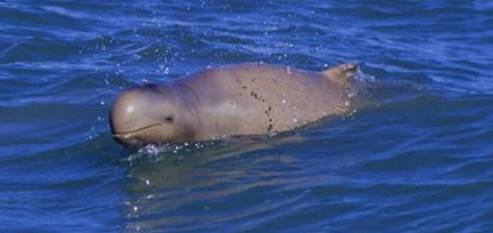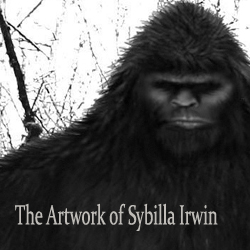New Dolphin Discovered?
Posted by: Loren Coleman on August 1st, 2008
The Australian media is in a whirlwind because allegedly the “first pictures of what has been dubbed the world’s ugliest dolphin were shown on Australian television on Thursday. The snub fin dolphin with its distinctive bulbous head was first identified three years ago off Western Australia’s remote Kimberley coast.”
But, of course, photos had been published before of this dolphin.
The Queensland government published one in its official 2007 bulletin on the species, an extract of which is shown below:
Australian snubfin dolphin
Common name: Australian snubfin dolphin
Scientific name: Orcaella heinsohni
Legislative name: Orcaella brevirostris
Conservation status: The Australian snubfin dolphin is listed as ‘Rare’ under the Queensland Nature Conservation Act 1992. This dolphin was assumed to be the Irrawaddy River dolphin (Orcaella brevirostris) until 2005 when genetic tests proved that it was a separate species. It is currently only known from Australia and its status in Queensland waters is very poorly known.

Adult Australian snubfin dolphin off Townsville. Photo: Guido Parra
Description: The Australian snubfin dolphin is a relatively small cetacean (dolphin and whale family). Adults average 2 metres in length (maximum male – 2.75m, maximum female – 2.32m). It has a blunt, rounded head and no beak. There are 12-19 small, conical teeth on each side of both jaws. The blowhole is left of the midline. It has an obvious, flexible, neck, and neck creases may be present.
The flippers are large and broad, with a gently curved leading edge. The dorsal (back) fin is small and triangular with a bluntly rounded tip, and barely concave rear margin. It is situated behind the midpoint of the body. The flukes (tail fins) are notched and have a shallow concave trailing edge. The colour is generally pale to dark brown with the ventral (underside) surface lighter in colour. This species is often confused with the dugong, which lacks a dorsal fin and has a more full-bodied shape.
Habitat and distribution: It has been recorded across northern Australia (Qld, NT, WA) where it inhabits riverine, estuarine and coastal waters, but the distribution has been poorly documented.
Diet: The Australian snubfin dolphin is a generalist feeder, taking food from the bottom and the water column. Its diet consists primarily of fish, but includes cephalopods (such as squid and octopus) and crustaceans (such as prawns and crabs).
Behaviour and life history: The Australian snubfin dolphin is usually seen in groups of 5 to 6 animals, but groups of up to 15 animals have been observed. When undisturbed they typically make short dives, surfacing quietly at 30-60 sec intervals. They can submerge for up to 12 minutes when disturbed. Tail-slapping and partial jumps have been observed, but they do not leap clear of the water or bow-ride. Vocalisation (sounds/language) includes broadband clicks, pulsed sounds and whistles.
====
But now, various Australian media (see here, here, and see video here) seems to be indicating that two species may be involved. Or the reporters are confusing this 2005 discovery as a “new” one?
The media is reporting that scientists hope DNA samples taken from a group of dolphins swimming off the coast of Broome in Western Australia will establish if it represents a local sub-species or even a previously unknown species.
The researchers suspect that the group a may be a sub-species of the locally endemic snubfin dolphin, which was only identified in 2005. The snubfin has a shorter dorsal fin and more rounded snout than other dolphin species. Small populations were found off the Northern Territory and Queensland coasts.
An alternative theory is that the dolphins now being studied are an entirely distinct species.
About Loren Coleman
Loren Coleman is one of the world’s leading cryptozoologists, some say “the” leading living cryptozoologist. Certainly, he is acknowledged as the current living American researcher and writer who has most popularized cryptozoology in the late 20th and early 21st centuries.
Starting his fieldwork and investigations in 1960, after traveling and trekking extensively in pursuit of cryptozoological mysteries, Coleman began writing to share his experiences in 1969. An honorary member of Ivan T. Sanderson’s Society for the Investigation of the Unexplained in the 1970s, Coleman has been bestowed with similar honorary memberships of the North Idaho College Cryptozoology Club in 1983, and in subsequent years, that of the British Columbia Scientific Cryptozoology Club, CryptoSafari International, and other international organizations. He was also a Life Member and Benefactor of the International Society of Cryptozoology (now-defunct).
Loren Coleman’s daily blog, as a member of the Cryptomundo Team, served as an ongoing avenue of communication for the ever-growing body of cryptozoo news from 2005 through 2013. He returned as an infrequent contributor beginning Halloween week of 2015.
Coleman is the founder in 2003, and current director of the International Cryptozoology Museum in Portland, Maine.










I don’t see it as a “ugly.” It actually looks kind of cute. A better name for it would be “whale dolphin.”
Good link and story, Loren…
“Legislative name?” what is it, running for Parliament?
I don’t think it’s ugly at all. How cool is it that it can move it’s head and may have neck creases?! Can’t wait for the DNA testing to be done! 🙂
yeah it looks like it can turn its head like a human. kinda reminda me of me….beutiful 🙂 i can turn my head and swim too!
I agree with the others who have posted; I don’t see it as ugly in the least. To me, it rather looks like a beluga with a tropical tan. 🙂
Geez, they hardly know the poor guy, and they’re calling him ugly. Maybe a “Simpsons Halloween Special”-like uprising is in order!
It looks like a swimming tumor
Ugly? This person never saw the Indus and Ganges River Dolphins!
You are in a nice state of mind “ashura”.
Ben Franklin stated:
“Beauty, like supreme dominion, is but supported by opinion.”
Beauty is in the eye of the beholder, and I think it is beautiful.
in my opinion, it’s some sort of beluga.
The original report here was on Channel Ten, it was their cameras on the boat and I’m pretty sure they claimed it was the first VIDEO footage. They must have known the original Qld photo existed as they used it in their report. From my memory of their report, that was the only claim they made, plus the collection of the DNA. According to the WWF, who are conducting the research (do a search for WWF Australia, and then click on the “species” link), they are going to do the DNA analysis to check if the northwestern population is a separate species or sub species or species of the ones discovered off Qld. It has been proved to be distinct from the Irrawaddy dolphin.
I think that he’s a cutie, and isn’t ugly at all.
I wonder why anyone would think it was ugly?
It does look a tad peculiar, though I wouldn’t call it the ugliest out there. BTW, has anyone ever actually seen a swimming tumer?
I agree with everyone who said it looks like a beluga.
And how can it be ugly with that smile on its face?
How can people say it’s “ugly”? It looks just like a beluga whale. Nobody ever said that was ugly. People are so crude and afraid of the unknown.